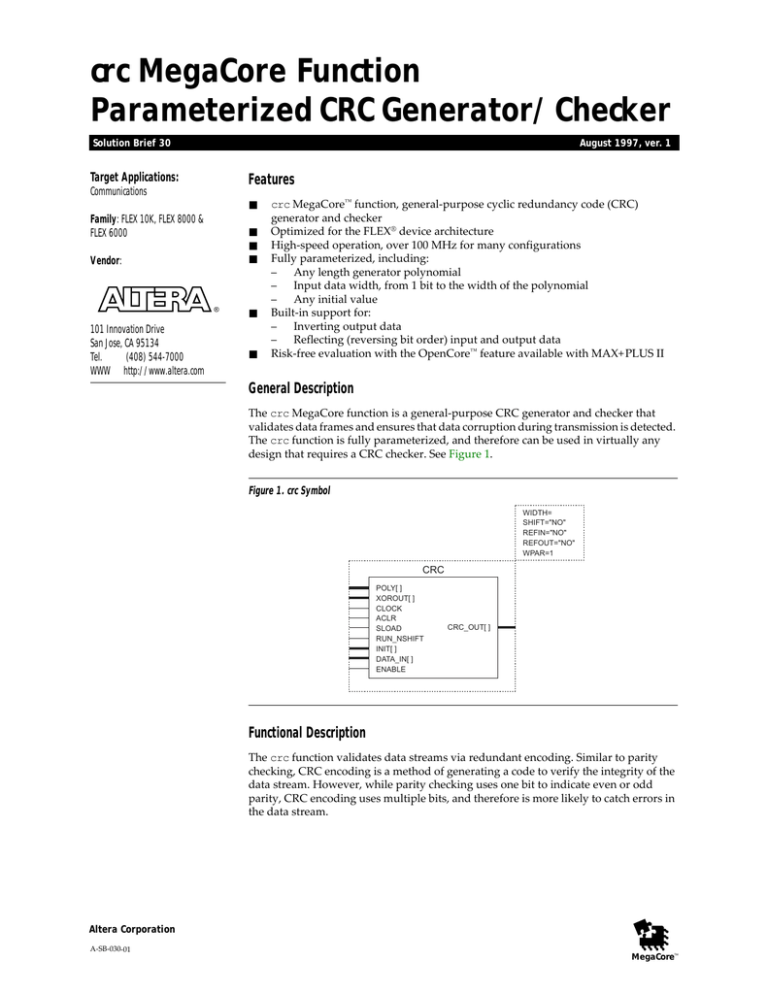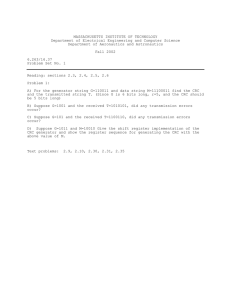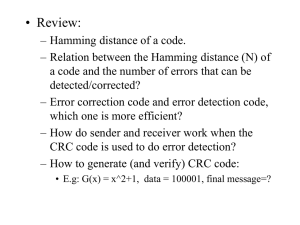
crc MegaCore Function
Parameterized CRC Generator/Checker
Solution Brief 30
August 1997, ver. 1
Target Applications:
Features
Communications
■
Family: FLEX 10K, FLEX 8000 &
FLEX 6000
■
■
■
Vendor:
®
101 Innovation Drive
San Jose, CA 95134
Tel.
(408) 544-7000
WWW http://www.altera.com
■
■
crc MegaCore™ function, general-purpose cyclic redundancy code (CRC)
generator and checker
Optimized for the FLEX® device architecture
High-speed operation, over 100 MHz for many configurations
Fully parameterized, including:
–
Any length generator polynomial
–
Input data width, from 1 bit to the width of the polynomial
–
Any initial value
Built-in support for:
–
Inverting output data
–
Reflecting (reversing bit order) input and output data
Risk-free evaluation with the OpenCore™ feature available with MAX+PLUS II
General Description
The crc MegaCore function is a general-purpose CRC generator and checker that
validates data frames and ensures that data corruption during transmission is detected.
The crc function is fully parameterized, and therefore can be used in virtually any
design that requires a CRC checker. See Figure 1.
Figure 1. crc Symbol
WIDTH=
SHIFT="NO"
REFIN="NO"
REFOUT="NO"
WPAR=1
CRC
POLY[ ]
XOROUT[ ]
CLOCK
ACLR
SLOAD
RUN_NSHIFT
INIT[ ]
DATA_IN[ ]
ENABLE
CRC_OUT[ ]
Functional Description
The crc function validates data streams via redundant encoding. Similar to parity
checking, CRC encoding is a method of generating a code to verify the integrity of the
data stream. However, while parity checking uses one bit to indicate even or odd
parity, CRC encoding uses multiple bits, and therefore is more likely to catch errors in
the data stream.
Altera Corporation
A-SB-030-01
ALTERA MEGAFUNCTION PARTNERS PROGRAM
MegaCore
TM
crc MegaCore Function Parameterized CRC Generator/Checker
CRCs are particularly effective for two reasons:
■
■
CRCs provide excellent protection against common errors such as burst errors, in
which consecutive bits in a data stream are corrupted during transmission.
The original data is the first part of the transmission, which makes systems that use
CRCs easy to understand and implement.
Because the crc function is fully parameterized, virtually any CRC algorithm can be
implemented using the parameters available with this function. To maximize
flexibility, the crc function also allows designers to set port values, e.g., initial register
values can be set via the init[] input.
The designer can define the size of the crc function’s generator polynomial to meet
design specifications. The larger the CRC polynomial length, the greater the chance of
transmission error detection.
A vector generation program, available with the crc function, has the same parameters
as the crc function and generates vector files to verify the operation.
Performance
Table 1 lists sample crc function performance and logic cell usage.
Table 1. Sample crc MegaCore Function Performance & Logic Cell Usage
CRC Configuration with FLEX Devices
Note (1)
CRC-32
generator polynomial
32-bit wide Input
CRC-16/CCITT
generator polynomial
Size (LEs)
Note (2)
Performance (MHz)
Note (2)
Performance (Mbits/s)
318
28
8-bit wide input
87
70
896
560
1-bit wide input
32
>125
>125
1200
16-bit wide input
39
75
8-bit wide input
24
100
800
1-bit wide input
16
>125
>125
Notes:
(1)
(2)
When calculating performance, the fastest speed grade from the FLEX 10K, FLEX 8000, and FLEX 6000 device families was used.
The size and performance of the crc function will vary depending on the logic synthesis settings, device fitting, and the chosen
polynomial.
f
Go to the crc MegaCore Function Parameterized CRC Generator/Checker Data Sheet for more
information.
Reference
Williams, Ross N. A Painless Guide to CRC Error Detection Algorithms. Version 3.
Hazelwood Park, Australia: Rocksoft PTY Ltd, 1996.
This document explains CRCs and their table-driven implementations, and also
provides a generic parameterized model CRC algorithm. For more information, go to
the Rocksoft world-wide web site at: http://www.rocksoft.com.
®
101 Innovation Drive
San Jose, CA 95134
(408) 544-7000
http://www.altera.com
2
Copyright 1997 Altera Corporation. Altera, FLEX, FLEX 10K, FLEX 8000, FLEX 6000, MAX, MAX+PLUS, MAX+PLUS II, OpenCore, and
MegaCore are trademarks and/or service marks of Altera Corporation in the United States and other countries. Other brands or products are
trademarks of their respective holders. The specifications contained herein are subject to change without notice. Altera assumes no
responsibility or liability arising out of the application or use of any information, product, or service described herein except as expressly
agreed to in writing by Altera Corporation. Altera customers are advised to obtain the latest version of device specifications before relying on
any published information and before placing orders for products or services. All rights reserved.
Altera Corporation




